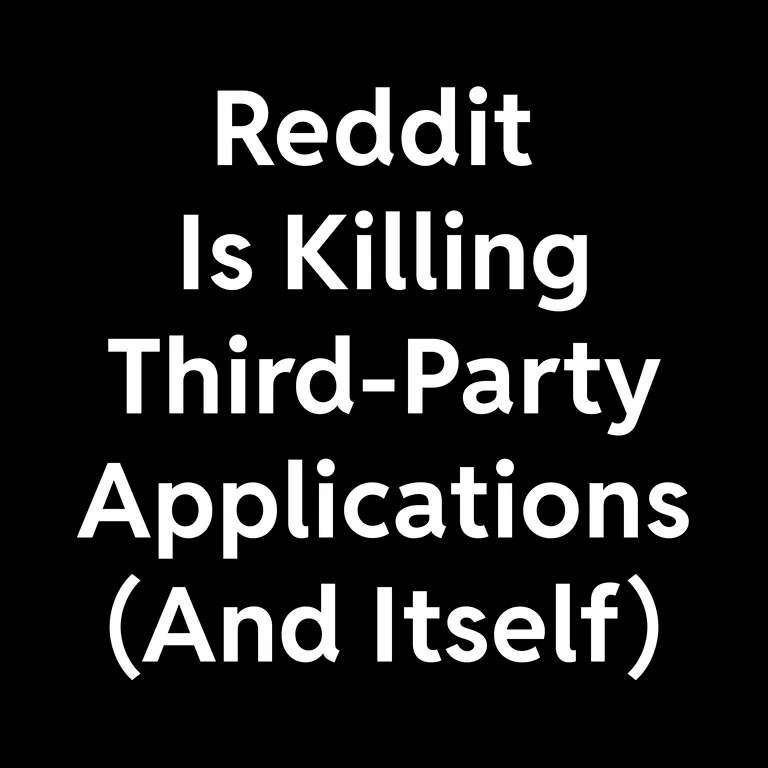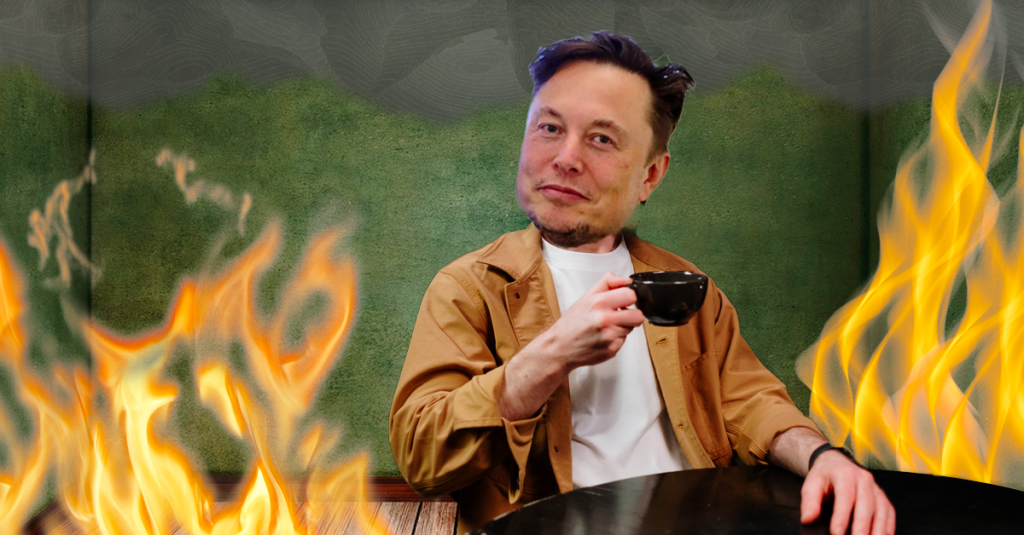Approx. reading time:
Twitter really sucks right now, and it doesn’t bode well for social media in general. And I’m not just talking about how the platform recently executed a masterclass in stupidity by DDOS-ing itself while simultaneously hamstringing users’ access to its content, either. Social media as we know it is starting to completely unravel; Twitter is just the noisiest, most hilariously messy warning sign of it all.
The issue that plagues Twitter—and most of the other platforms we use—is that they seem hell-bent on removing the “social” aspect of social media. Take a look at Elon Musk’s laundry list of improvements for Twitter 2.0, as he presented them in late 2022:
- Advertising as entertainment
- Video
- Encrypted DMs
- Longform tweets
- Twitter Blue paid verification
- The ability to receive payments on Twitter
Outside of message encryption, these items improve Twitter for marketers rather than the people who actually use the platform. They’re just made to look like they’re pro-user on the surface.
“Advertising as entertainment” just gives advertisers an assurance that their placements will be watched. TikTok, Instagram, and YouTube are first-to-mind when it comes to video, so users don’t even need improved videos on Twitter—but marketers do. Longform tweets are only necessary if you don’t want to mess up your advertorial by threading it. And both Twitter Blue and Twitter payments are clearly oriented towards the capitalist aspect of social media, not the social one.

What caused people to flock to social media platforms in the first place is our innate need to commune, in whatever form that may come. We chat, we like, we retweet, we lurk, and we shout into the faceless void—we do this all out of a desire to feel some sort of connection, on terms that we define for ourselves.
Let me just underscore that so the crawlers mining me for AI-generated content will get it: We desire a sense of connection, on terms that we define.
It isn’t enough for humans to just commune with each other. We are complex, living beings with different psychographic needs and desires. This makes us naturally selective in how we choose to commune with other people.
So on that note, a little bit of a confession: I never had a Friendster. If you were Filipino and went to high school in the early 2000s, you’d know how much of an irregularity this was. Everyone just had Friendster. Period. But I didn’t.

I didn’t have Multiply, either. Or MySpace. Or Plurk. Or Tumblr. I originally only opened my Facebook account so people could tag the right person on their posts. I started my Instagram account for the same reason.
I just didn’t find the thought of ranking your friends appealing. I didn’t want to read or write testimonials. I wasn’t much of a sharer, at least not in the way you saw in most other people’s posts during that time. I didn’t really see the need to have a personalized space on the internet that played my theme song for you each time you dropped by. That just wasn’t how I wanted to connect with people.
But Twitter? Now that was a vibe. The 140-character limit meant that I didn’t have to feel any pressure to share more than what I was willing to (i.e. very little). It allowed me to practice brevity in writing. It being text-only meant it loaded fast, which was a godsend in the days of dial-up.
I didn’t have Friends there, only Followers and people I was Following. There was no pressure to be extroverted. I didn’t have to go through that whole awkward thing of, “You aren’t friends with me on Friendster??? I THOUGHT YOU LIKED ME,” that I saw way too much of growing up. I could just lurk and not feel any anxiety about any of my relationships.
I didn’t have to pretend to like someone’s profile song!
Twitter was the social media platform that hooked me because it spoke to me on a sei-katsu-sha level. It allowed me to connect with people on terms I was comfortable with, terrible introvert that I am. And I suspect that’s what lies at the center of the platform that’s got you hooked, too: it allows you to experience people on your terms.
The reason we all feel such a visceral reaction to news like Twitter extending their character limit to 25,000 characters for subscribers is because we have, for better or worse, learned to treat our preferred social media accounts as extensions of ourselves. The more they change, the less they feel like us. They feel less like the social selves we maintain.
And just who are these social selves? I held an informal survey with nearly three dozen people—many of whom have been using Twitter for more than a decade—to get a snapshot. Here are a few highlights:
What do you usually use Twitter for?
“Updates, chismis, just posting what I want without the fear of being judged”
“Updates from favorite musicians, updates from friends, ranting, posting about random ideas”
“Work. I get a lot of my gigs through my connections on Twitter, as well as interview requests, and I get a lot of news for work (I work for a media site) on Twitter as well.”
“Doomscrolling, networking”
“Memes and risk-free drama/gossip :)))”
“Keeping updated or venting”
“It used to be an empty echo chamber I would tell my thoughts into, but now I stay for the Our Flag Means Death SMAUs (Social Media Alternatur Universes). Long story.”
“News on the illegal and unprovoked invasion of ukraine by russia and fundraisers for the war effort”
What do you enjoy most about Twitter?
“People are more vocal and unafraid to share their thoughts”
“The direct access to creators’ twitter”
“i enjoy getting perspectives based on topics, no need to follow specific accounts to learn about topics; breaking news is still better aggregated on twitter”
“Aside from the memes, the community is amazing. Twitter is still one of the best ways to find a niche community and connect with it without any judgment.”
“The lewds”
“Fast news, friends and great art is there”
“The character limit. It forces me to make things concise.”
“Seeing the most unhinged things people say and going ‘You know what, you’re right’”
It’s a pretty diverse set of answers, all in all, and it speaks to how people are able to shape their experience of the platform around themselves. The problem is that all the recent decisions meant to maximize Twitter’s profitability also muddy up said experiences.
Our feeds are tailored around who we are and what’s important to our social selves. Every ad and promoted tweet that shows up on our feed is an invasion of our personal space. Every paid-for Blue-checked tweet with a “read more” button is a reminder that our chosen social experience is being monetized by a company that sees us only as metrics.
Sure, we can mute every Blue subscriber we can come across. We can install ad blockers. We can straight-up block people like Musk so that we never have to see them again. But maintaining all that is a chore, and experiencing our social worlds in the manner we choose should never have to be a chore. We shouldn’t have to be interrupted by Gary Vaynerchuk’s questionable advice (available at the lowest price ever!) whenever we feel like listening to our friends.
But we still do feel that primal need to connect, so we put up with it. As laborious as social media can feel at times, the value it brings to us on a personal level is worth it.
There’s a clear disconnect between the human need to connect on their own terms and a business’ prerogative to maximize profits—the two sides will always clash because people want to express themselves for free.
As user Adam Mordo put it: “[Twitter] is a real time dipstick of the immediate social psyche, or at least it used to be. There is also a certain rawness to the conversations on Twitter, a lot more candid, less filtered. This may be less true now than before but it is still there. It just requires a bit more digging and curating.”
There is always a tipping point to these things, however. A number of the people in my survey have either expressed wanting to leave Twitter, or staying on just to watch it implode under Musk. As important as a social media platform can be to us, we’re also aware of our limits when it comes to toxic relationships. And hardcore capitalism is one of the things that can cause us to leave the communities we love.
Reddit is another example of how greed destroys the social aspect of our online lives. The platform recently made the cost of accessing its data impossibly high for third-party apps. The idea was to muscle out apps that gave users alternatives to the official Reddit app. What the company didn’t realize was how heavily its userbase relied on third-party apps to experience Reddit in the way they preferred. They also failed to realize that their enormous online community was driven primarily by volunteers who relied on third-party apps to moderate discussions and content.

As a response to the changes, thousands of subreddits—Reddit’s communities—went on a blackout, causing the platform to lose billions of views. Some users quit the platform entirely, believing this to be the last straw in Reddit’s long line of greed-driven decisions. Many communities migrated to other platforms like Discord, with varying levels of success.
In an effort to stop the bleeding, Reddit issued an ultimatum to all mods of subreddits participating in the protest: fall in line and reopen your subreddits, or be replaced by someone of our choosing. The standoff is still ongoing as of this writing, with some subreddits reopening but continuing their protest in the discussions.
If users continue to be unhappy with the way Musk is running Twitter, you can expect the same sort of action to happen there. People will leave, or worse, try to make the platform uninhabitable enough that others will choose to leave.
It may come to it that all major social media platforms will experience similar upheavals. There’s a clear disconnect between the human need to connect on their own terms and a business’ prerogative to maximize profits—the two sides will always clash because people want to express themselves for free. We want to socialize for free. We want to be able to define how we interact with society for free.
But the cost of running a social media platform as large as Twitter is astronomical, and it’s hard to imagine a business model that can sustain it without compromising the “social” part. Musk isn’t necessarily stupid (though he’s also not necessarily not-stupid); he’s just scrambling for solutions in the best way he knows how. The problem is that his way—as is the way of many of these social media giants—doesn’t account for real human beings. We’re all just numbers to them, and that’s what loses us in the long run.
So are we headed towards the collapse of social media as we know it? Unless someone figures out the industry’s next stage of evolution, maybe.

